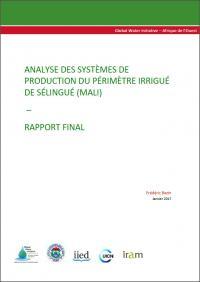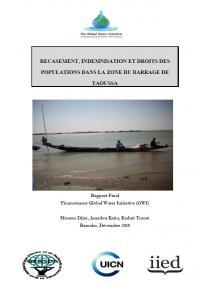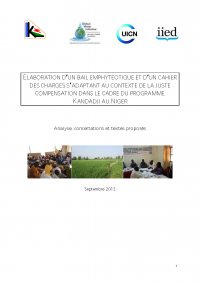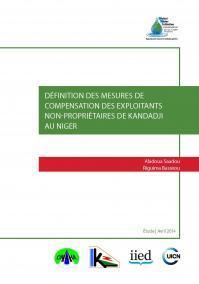
Topics and Regions
Communication adviser
Global Water Initiative (GWI)
International union for conservation of nature (IUCN)
GWI West Africa is implemented by IIED and IUCN and works in five focus countries: Burkina Faso, Guinea, Mali, Niger, and Senegal – as well as regionally. We work closely with government, donors, farmers, river basin organisations, NGOs and research communities at local, national, regional and international levels. You can find out more by reading about Our partners.
Details
Location
Contributions
Displaying 1 - 10 of 31Analysis of the productive systems in the Bagré irrigation scheme (Burkina Faso)
The development of irrigation is one of the priority strategies in the Sahel countries to tackle poverty and food insecurity. At a time when governments are once again committing to increase irrigable areas, it seemed relevant to analyze, in line with the ECOWAS guidelines, the results achieved in large irrigated schemes developed in the 1980s and 1990s to draw lessons for future developments.
Analyse des systèmes de production du périmètre irrigué de Bagré (Burkina Faso)
Le développement de l’irrigation fait partie des stratégies prioritaires dans les pays du Sahel pour lutter contre la pauvreté et l’insécurité alimentaire. À l’heure où les gouvernements s’engagent, une fois de plus, à augmenter les superficies irrigables, il a semblé pertinent d’analyser, conformément aux lignes directrices de la CEDEAO, les résultats obtenus sur des grands périmètres aménagés dans les années 80 et 90 afin d’en tirer les leçons pour les aménagements futurs.
Analysis of the productive systems in the Sélingué irrigation scheme (Mali)
The development of irrigation is one of the priority strategies in the Sahel countries to tackle poverty and food insecurity. At a time when governments are once again committing to increase irrigable areas, it seemed relevant to analyze, in line with the ECOWAS guidelines, the results achieved in large irrigated schemes developed in the 1980s and 1990s to draw lessons for future developments.
Analyse des systèmes de production du périmètre irrigué de Sélingué (Mali)
Le développement de l’irrigation fait partie des stratégies prioritaires dans les pays du Sahel pour lutter contre la pauvreté et l’insécurité alimentaire. À l’heure où les gouvernements s’engagent, une fois de plus, à augmenter les superficies irrigables, il a semblé pertinent d’analyser, conformément aux lignes directrices de la CEDEAO, les résultats obtenus sur des grands périmètres aménagés dans les années 80 et 90 afin d’en tirer les leçons pour les aménagements futurs.
Resettlement, compensation and rights of local populations in the area of the Taoussa dam (Mali)
Document language:
French
Author(s):
Moussa Djiré, Amadou Keita, Kadari Traoré
Securing land tenure for farmers in the Sélingué and Maninkoura irrigation schemes
This study presents the results of field interviews with farmers, managers and the private sector from the Sélingué and Maninkoura (Mali) irrigation schemes to discuss how the current terms and conditions of the farming contract are implemented. These interviews focused on the functioning of the land management system as perceived by the stakeholders. The aim was to discuss the necessary and possible reforms of land tenure security which might allow a better development of smallholder farms.
Study of the legal status of public land in irrigation schemes in Kandadji
37,891 inhabitants were displaced when the Kandadji dam was built in Niger. We carried out a study of the legal aspects of such displacement, examining ways for the State to optimise its investment whilst also seeking justice for displaced populations. This study weighs up the various options for managing legal processes within the affected areas of dams.
Development of an emphyteutic ('long-term') lease for fair compensation in the context of the Kandadji dam programme in Niger
The Kandadji dam, currently under construction in Niger, will displace 38,000 people. The High Commission for the Development of the Niger Valley (HCAVN), in accordance with national law, is committed to compensating people for the traditionally-owned land that they will lose.
Defining compensation measures for non-landowning producers at Kandadji in Niger
Construction of the Kandadji dam in Niger will involve, among other consequences, the appropriation of agricultural land owned by customary holders but also in many cases sub-holdings of other non-landowners. The government offered a long lease of 50 years for owners in compensation for their expropriated property rights.
How should the State compensate for the loss of the right of use by non-landowners farming land expropriated for the development of the Kandadji dam? This study aims to answer this question and proposes the use of a 'contract of occupation'.
Analysis of the legal texts and reforms needed for the management of irrigated land in Niger
The start of the work of the Kandadji Programme, for the construction of the Kandadji dam, has provided the opportunity to analyse and reflect on the legal texts relating to irrigated land in Niger. This has led to strong recommendations for improving the legal framework for the management of public land, particularly irrigated land.








